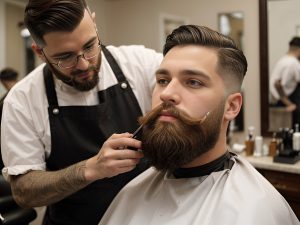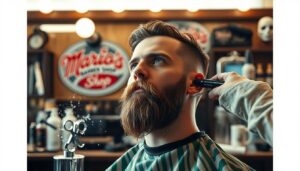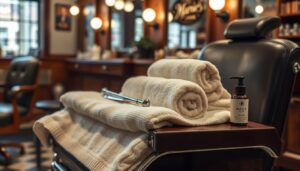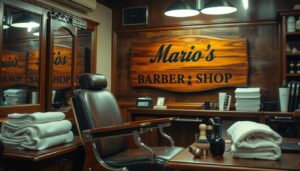Grooming your beard is more than just a routine – it’s an essential step in crafting a polished, confidence-boosting look. But have you ever wondered if you’re truly maximizing the potential of your facial hair? What if there were expert-approved techniques that could take your beard game to the next level?
In this comprehensive guide, we’ll unveil the secrets to achieving the perfect beard trim, courtesy of industry-leading professionals. Discover how to understand your unique facial hair growth patterns, master the essential grooming tools, and execute a step-by-step trimming process that leaves you looking and feeling your absolute best. Get ready to turn heads and embrace a newfound sense of self-assurance with every expertly-trimmed hair.
Are you ready to unlock the transformative power of a perfectly groomed beard? Join us as we delve into the expert tips and tricks that will have you looking sharp and feeling confident in no time.
Understanding Your Facial Hair Growth Pattern
Achieving the perfect beard trim starts with understanding the unique growth pattern of your facial hair. Each person’s beard has distinct characteristics, from the direction of hair growth to variations in density across different areas of the face. By recognizing these individual nuances, you can better navigate the beard grooming process and maintain the ideal beard shape.
One of the key aspects to consider is the direction of hair growth. Some men may have a predominant upward growth pattern on the cheeks, while others might have a more sideways or downward trajectory. Identifying these subtle differences can help you adjust your trimming techniques accordingly and ensure a well-defined, symmetrical look. Similarly, analyzing the density of hair across your face can guide you in determining the appropriate beard length and shaping.
By taking the time to closely observe your facial hair growth pattern, you’ll be better equipped to use the right beard grooming tools and employ effective techniques for maintaining the perfect beard shape. This understanding will not only help you achieve your desired look but also prevent common trimming mistakes that can disrupt the natural balance of your facial features.
Essential Beard Grooming Tools for the Perfect Trim
Achieving a well-groomed, pristine beard requires the right tools in your arsenal. Whether you’re a seasoned beard enthusiast or just starting your facial hair journey, mastering the essential beard grooming tools is key to maintaining a sharp, stylish look. From high-quality trimmers to precision scissors and artful combs, these instruments are the foundation for expert tips for a perfect beard trim.
Investing in a reliable beard trimmer is the first step. Look for models with adjustable guards and blades that can handle various beard lengths and styles. Scissors are invaluable for detailed shaping and taming stray hairs, so opt for a pair of sharp, precision-crafted blades. Combs and brushes, in turn, help train your beard, distribute oils evenly, and keep it looking neat and tidy.
When selecting your beard grooming tools, consider the unique characteristics of your facial hair. Coarse, thick beards may require stronger trimmers and wider-tooth combs, while softer, finer hair calls for gentler, more delicate tools. With the right equipment in hand, you’ll be on your way to achieving a perfectly trimmed, well-groomed beard that boosts your confidence and elevates your personal style.
Expert Tips for a Perfect Beard Trim: Step-by-Step Guide
Achieving a flawless beard trim is an art form, and with the right techniques, you can maintain a sharp, well-groomed look. In this step-by-step guide, we’ll share expert beard trimming techniques to help you master the perfect beard trim.
Start by thoroughly cleansing and drying your beard. This ensures that your hair is free of any oils or products, making it easier to achieve a clean, even trim. Next, use a high-quality beard comb to gently detangle and separate your facial hair, ensuring that each strand is visible and accessible.
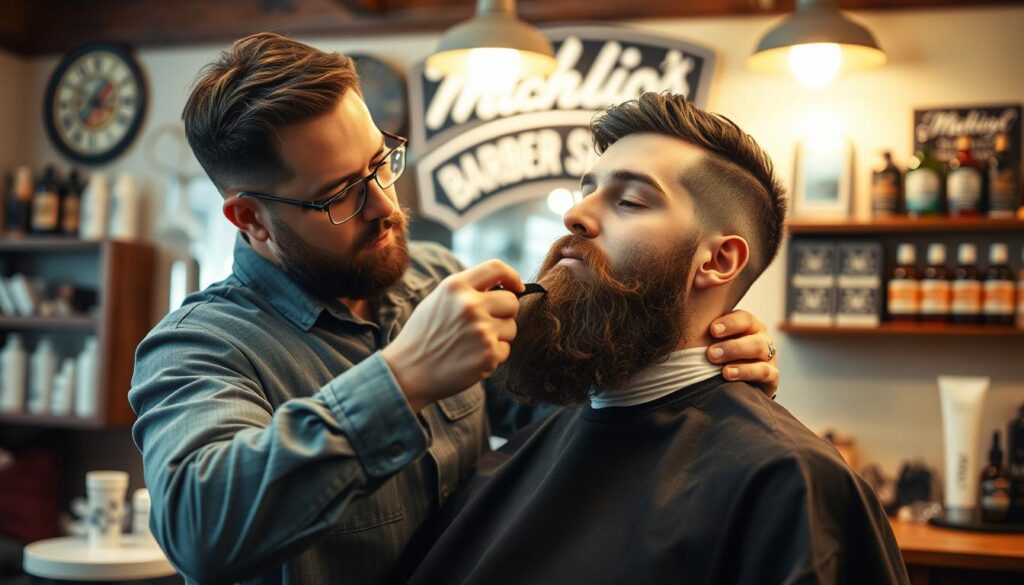
With your beard primed and ready, it’s time to begin the trimming process. Start by outlining your desired neckline and cheek lines, using a precision trimmer or edger to create a clean, defined shape. Gradually work your way inward, trimming the bulk of your beard to your preferred length using sharp, high-quality beard scissors.
Remember to take your time and make small, gradual adjustments. Rushing through the process can result in uneven or jagged edges. Regularly check your progress and make any necessary refinements to achieve the perfect beard trim.
By following these expert tips for a perfect beard trim, you’ll be able to maintain a well-groomed, confident look that perfectly complements your unique facial features. With a little practice and patience, you’ll be on your way to mastering the art of beard trimming.
Mastering the Art of Neckline Definition
Achieving a well-defined neckline is a crucial aspect of maintaining an impeccable beard. The neckline not only frames your face but also plays a vital role in trimming neckline and cheek lines to create a polished, professional look. Mastering this technique can be a game-changer for your overall beard appearance and maintaining beard shape.
Start by identifying the natural growth pattern of your facial hair. This will help you determine the optimal placement for the neckline. As a general rule, the neckline should be approximately one to two finger-widths above your Adam’s apple, following the natural curve of your jawline. This placement will help create a clean, symmetrical look that complements your facial features.
When it comes to trimming neckline and cheek lines, use a sharp, high-quality trimmer or razor to achieve a precise, well-defined edge. Gently guide the trimmer along the desired neckline, following the natural contours of your face. Avoid creating a harsh, straight line, as this can look unnatural. Instead, aim for a slightly curved, natural-looking neckline that blends seamlessly with the rest of your beard.
Remember, the key to mastering the art of neckline definition is patience and attention to detail. Take your time, experiment with different placements, and be mindful of maintaining maintaining beard shape for a truly polished and professional appearance.
Creating Symmetrical Cheek Lines: Professional Techniques
Achieving symmetrical cheek lines is a crucial step in perfecting your beard trimming routine. The positioning of your cheek lines can significantly impact the overall appearance of your facial hair, so it’s important to master this technique. Let’s explore some professional tips to help you create a flawless, balanced look.
First and foremost, understand that the ideal cheek line placement varies based on your face shape. For those with rounder faces, a slightly higher cheek line can help elongate the appearance and create a more defined jawline. Conversely, individuals with angular or square-shaped faces may benefit from a lower cheek line to soften their features. Experiment with different positions to find the most flattering look for your unique facial structure.
When it comes to trimming neckline and cheek lines, precision is key. Utilize a high-quality trimmer with sharp blades to ensure clean, even cuts. Start by establishing a baseline on one side of your face, then carefully mirror the same line on the other side. Regular maintenance is crucial to maintain symmetry, so be sure to touch up your cheek lines as needed between full beard trims.
Mastering beard trimming techniques takes practice, but with patience and attention to detail, you’ll be able to create the perfect symmetrical cheek lines that complement your face and enhance your overall grooming game. Remember, the goal is to find the right balance that highlights your best features and boosts your confidence.
Choosing the Right Beard Length for Your Face Shape
When it comes to styling different beard types, the key to achieving a sharp, confident look lies in choosing the right beard length for your unique face shape. Whether you’re aiming for a classic short trim or embracing a fuller, longer style, understanding how beard length interacts with your facial features is crucial for maintaining the perfect beard shape.
For individuals with a round face, a medium-length beard can help create a sleeker, more angular appearance by adding definition to the jawline. On the other hand, those with a square-shaped face may find that a slightly longer beard helps soften the sharper angles, creating a more balanced and harmonious look. Oval-faced individuals have the versatility to experiment with a range of beard lengths, from short stubble to a full, well-groomed style.
The art of maintaining beard shape is all about finding the right balance between your facial features and the length of your facial hair. By paying close attention to the contours of your face and adjusting your beard trim accordingly, you can unlock a level of confidence and personal style that truly accentuates your unique features.
Preventing Common Beard Trimming Mistakes
Maintaining a well-groomed beard can be a delicate balancing act, and it’s easy to make mistakes that can compromise the look and health of your facial hair. However, with the right techniques and a bit of know-how, you can easily avoid common pitfalls and keep your beard looking sharp and healthy.
One of the most common mistakes is over-trimming. It’s tempting to want a crisp, clean-cut look, but taking too much length off can leave your beard looking patchy and uneven. Instead, take a gradual approach, trimming just a little at a time and checking the results before going further. This will help you prevent preventing ingrown hairs and ensure a more natural, flattering appearance.
Another common issue is uneven lines, particularly around the cheeks and neckline. To avoid this, be sure to use a high-quality trimmer and take your time, paying close attention to the symmetry of your facial hair. Consulting with a professional barber can also be helpful if you’re unsure of the best techniques for your face shape and beard style.
Finally, improper tool usage can lead to all sorts of problems, from preventing split ends to accidental nicks and cuts. Always make sure your trimmer is clean and well-maintained, and take the time to understand how to use it properly. Invest in a good quality trimmer and consider adding a beard brush to your grooming routine to help distribute oils and keep your facial hair healthy and manageable.
By avoiding these common mistakes and following best practices for beard trimming, you can keep your facial hair looking its best and feeling healthy and comfortable. With a little care and attention, you’ll be well on your way to achieving the perfect beard trim every time.
Advanced Styling Techniques for Different Beard Types
Achieving the perfect beard trim is not a one-size-fits-all endeavor. Each beard type requires a unique approach to styling and maintenance. Whether you sport a full, lush beard or prefer a sleek goatee, our expert tips can help you master the art of styling different beard types.
For those with a full beard, precision and symmetry are key. Use a high-quality beard trimmer to meticulously shape the neckline and cheek lines, ensuring a clean, well-groomed appearance. Experiment with different beard lengths to find the style that best complements your facial structure.
Gentlemen with a goatee, on the other hand, should focus on maintaining the distinct outline and proportions of this classic look. Use a precision trimmer to carefully define the edges, creating a sharp, polished finish. Pair your goatee with a well-groomed mustache for a timeless, sophisticated style.
No matter your beard type, the secret to a perfect trim lies in consistent maintenance and the right tools. Invest in high-quality grooming products, and don’t be afraid to experiment with different techniques to find the look that makes you feel confident and stylish.
Managing Split Ends and Maintaining Beard Health
Maintaining the health and appearance of your beard is crucial for a well-groomed look. One common issue beard enthusiasts face is the dreaded split ends, which can make your facial hair appear unkempt and unruly. Fortunately, with the right beard trimming techniques and proper care, you can prevent and manage split ends, keeping your beard looking its best.
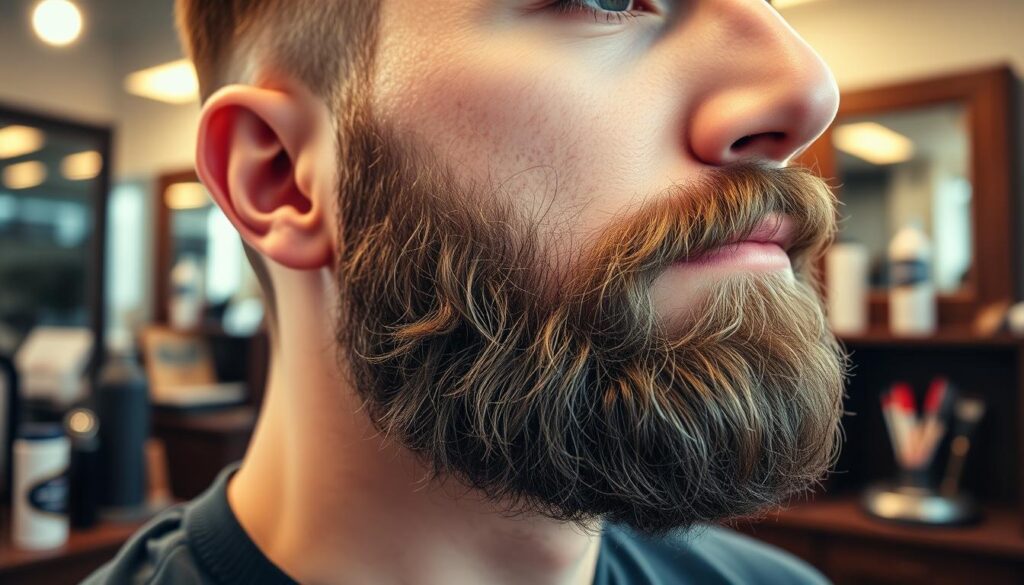
To prevent split ends, start with proper beard washing and conditioning. Use a gentle, sulfate-free shampoo and a high-quality beard conditioner to nourish and hydrate your facial hair. Avoid over-washing, as this can strip the natural oils your beard needs to stay healthy. After washing, gently pat your beard dry with a soft towel and apply a small amount of beard oil or balm to lock in moisture and prevent breakage.
When it comes to trimming your beard, be sure to use sharp, high-quality scissors or clippers designed specifically for beard grooming. Dull or improper tools can lead to split ends and uneven growth. Trim your beard regularly, targeting any split or damaged ends, to maintain a clean, well-defined look. Remember to trim in the direction of hair growth and avoid cutting too close to the skin, as this can also contribute to split ends.
Seasonal Beard Care: Adapting Your Trimming Routine
Maintaining a well-groomed and healthy beard requires adjusting your trimming routine to accommodate seasonal changes. As the weather fluctuates throughout the year, your beard’s needs will also evolve, demanding a more personalized approach to keep it looking its best.
In the colder months, the air’s dryness can take a toll on your facial hair, causing it to become brittle and unruly. To combat this, you’ll want to increase the frequency of your trims, ensuring your beard stays well-shaped and nourished. Complementing your trimming routine with a high-quality beard oil or balm can also help lock in moisture and prevent split ends.
As the warmer seasons approach, your beard may start growing more rapidly, requiring more frequent maintenance to maintain its desired length and shape. Additionally, sweat and humidity can lead to frizziness and uneven growth patterns. By adapting your trimming schedule to these seasonal changes, you can keep your beard looking sharp and well-groomed, no matter the weather.

